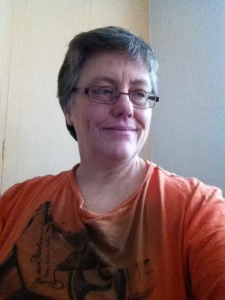 Here at Delib we take accessibility seriously, ensuring all of our apps work with assistive technologies so that anyone, irrespective of their abilities, can take part in democratic processes. A while back we heard about a Welsh community interest company who’d been founded with just such a purpose and, after meeting Anne Collis at Gov Camp Cymru (#gccy14), I thought she was probably well placed to expand on the subject.
Here at Delib we take accessibility seriously, ensuring all of our apps work with assistive technologies so that anyone, irrespective of their abilities, can take part in democratic processes. A while back we heard about a Welsh community interest company who’d been founded with just such a purpose and, after meeting Anne Collis at Gov Camp Cymru (#gccy14), I thought she was probably well placed to expand on the subject.
Let’s jump right in.
1. What’s you name and where are you from?
Anne Collis, from Bangor North Wales
2. What do you do for a living?
I’m one of the worker-directors of Barod Community Interest Company. Barod is Welsh for “ready”. We chose it because we are a mix of people with and without learning difficulties who got fed up being sent on “work readiness” courses when we were already ready to work.
3. Favourite band and / or artist?
I do like a bit of Pink Floyd, but Eminem is great when I’m getting in the zone for Crossfit.
4. Creature of habit or maverick thinker?
Definitely maverick. Barod’s strapline is “spreading ideas, changing attitudes”. We need a bit of maverick to make that happen.
5. You house is on fire, what do you save?
Me! Anything material can be replaced or you can learn to do without it.
6. Biscuits – dunk or leave unsullied?
Shock horror, I don’t eat biscuits since I started Crossfit. But Barod’s biscuit of choice is jaffa cakes, so if I had to eat one it would be gently nibbled in an unsullied state.
7. What does accessibility mean to you (or maybe, what should accessibility mean)?
It means being able to do what I want, how I want and when I want, without having to overcome barriers that only affect some people. Barriers could be things like money, where I live, the way things are done, or people’s bad attitudes and assumptions. I get frustrated when people use “accessibility” to mean “let’s change a few things for you personally because you don’t fit into the way we do things round here”. That’s my politely frustrated way of saying that I don’t like “reasonable adjustments” because that assumes it’s OK to carry on excluding people by how we do things as long as we are willing to sigh and do something different for individuals who we’ve excluded – if they have the confidence to insist we make things accessible to them.
8. What guidance exists to ensure things are accessible online and is it sufficient/ understood?
Funny you should ask that, as I was at a meeting with some lovely folks from Southampton University yesterday. The bottom line is that there are international evidence-based guides and standards for online accessibility but they focus on making sure the web is accessible to people with physical and sensory impairments. It’s really hard to find any research about making the web more accessible to more people with learning difficulties. And that’s an issue, because the project we are working on with Southampton University will probably need academics and people with learning difficulties to access a website on an equal footing.
9. Where do you see the field of online accessibility in ten years? Opportunities and pitfalls?
I have no idea about the techie stuff! Barod has started following some people on Twitter who could probably answer that one, like Alistair Somerville of Acuity Design. What I do know is that if the content is rubbish, the site will remain inaccessible even if the techie stuff is amazing.
10. Best project you’ve worked on at Barod and why?
Hard to pick a favourite. I think the most fulfilling thing we did was setting up Barod as a workers cooperative. We started with a bunch of ideas and visions, and slowly worked out the best way to turn them into reality. Our greatest moment had to be when clients stopped acting like the people without a learning disability were either the bosses or the support workers to the people with a learning disability and started to treat us as equals. The most fun came from a project that involved being paid to eat cake and drink coffee (those were the days before Crossfit when I still ate cake!) and chat to fascinating people. The aim was to find out what was going on in people’s heads rather than what they would say if they came to a consultation event. We call the method ‘coffee shop conversations’, and I’m currently seconded to Bangor University to develop a theoretical framework for the method. Watch this space…
11. Any shout-outs?
Got to do a shout-out to fellow directors, Alan Armstrong who I rely on to stop me from getting lost and to keep my feet on the ground, and Mal Cansdale who does an amazing job of oiling the wheels of Barod and who taught me to tweet. And a completely off-topic shout out to The Crossfit Place on Anglesey who in the last 9 months have got me physically and mentally fitter than I’ve ever been in my life.
So there we have it, 11 questions answered by the queen of accessibility (new job title?). Aside from some great pointers, I really like Barod’s wider obsession with Jaffa Cakes; something I both support and encourage…
If you’d like to talk to Anne, contact details can be found here and a Twitter follow is just a click away.